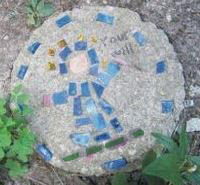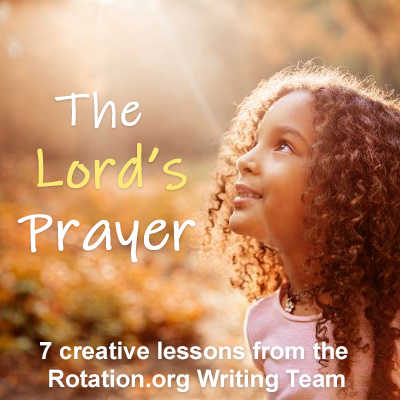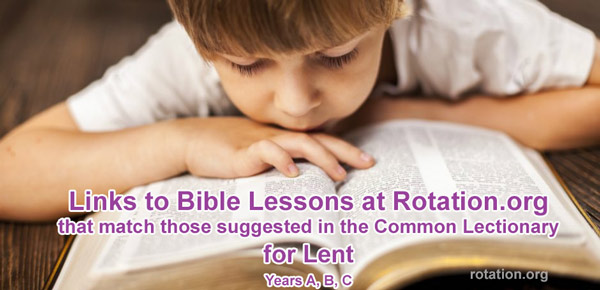
The "Revised Common Lectionary" is an ecumenical resource used by many churches, curriculum publishers, preachers, and denominations to schedule which passages to use in class and worship. The stories repeat every three years in cycles labeled "Year A, B, C."
Below, we have only listed the Bible stories they list for SUNDAYS in LENT in all three years, as those are the passages most likely to be used in worship and followed by the Sunday School.

Below we've listed the major stories for all three years of the Lectionary's Lent readings with links to our lessons and ideas here at Rotation.org.
As you can see, we have numerous creative Writing Team Lesson Sets that match the stories in the Lectionary. Some of the stories listed in the Common Lectionary have few if any resources here at Rotation.org for the reasons described below in our Notes. The Lectionary also recommends passages from Psalms, the Prophets, and New Testament Letters—many of which are not considered "major" stories suitable for children's Rotation-style Sunday School (and also don't make the cut in traditional curriculums).
Ash Wednesday
All three years in the Lectionary reference Matthew 6:1-6, 16-21, Jesus' teaches us to pray humbly, in private, and to fast. Their selection skips over The Lord's Prayer (which is unfortunate because the Lord's Prayer is what Jesus said to privately and humbly pray! Visit our Prayer, Spirituality in Sunday School forum for many ideas.
 The Writing Team Lord's Prayer lesson set teaches children "why and how" to pray.
The Writing Team Lord's Prayer lesson set teaches children "why and how" to pray.
FIND YOUR YEAR 
Year A (Lent 2026, 2029, 2032)
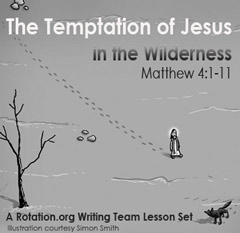 Matthew 4:1-11, Jesus' Temptation in the Wilderness.
Matthew 4:1-11, Jesus' Temptation in the Wilderness.
Public lesson forum | Writing Team Lesson Set
John 3:1-17, Nicodemus and Jesus
Public lesson forum | Writing Team Lesson Set
John 11:1-45, Raising of Lazarus
Public lesson forum | Writing Team Lesson Set
Genesis 2:15-17; 3:1-7, Adam and Eve
Public lesson forum | Writing Team Lesson Set
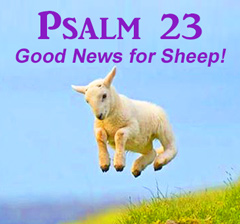 Exodus 17:1-7, Water from the Rock
Exodus 17:1-7, Water from the Rock
Public lesson forum | Writing Team Lesson Set
Psalm 23
Public lesson forum | Writing Team Lesson Set
Year B (Lent 2027, 2030, 2033)
Mark 1:9-15, Baptism of Jesus
Public lesson forum
 Genesis 9:8-17, Noah's Ark
Genesis 9:8-17, Noah's Ark
Public lesson forum
Genesis 17:1-7, 15-16, God's Covenant with Abram
Public lesson forum
Exodus 20:1-17, Ten Commandments
Public lesson forum | Writing Team Lesson Set
 The Writing Team's Ten Commandments Lesson Set was written during the COVID pandemic to be especially adaptable for easy at-home use. See excerpts and graphics from each lesson.
The Writing Team's Ten Commandments Lesson Set was written during the COVID pandemic to be especially adaptable for easy at-home use. See excerpts and graphics from each lesson.
Year C (Lent 2025, 2028, 2031)
Luke 4:1-11, Jesus' Temptation in the Wilderness.
Public lesson forum | Writing Team Lesson Set
 Luke 15:1-3, 11b-32, The Prodigal Son
Luke 15:1-3, 11b-32, The Prodigal Son
Public Lesson Forum | Writing Team Lesson Set
Luke 22:14-23:56, Lord's Supper
Public Lesson Forum | Writing Team Lesson Set
Notes and Point of View
The Common Lectionary is used by most major denominations to create a reading and teaching plan of scriptures for everyday use and Sunday worship. Many preachers use the Lectionary, for example, to decide what passage to preach.
Many children's curriculum follow the Lectionary, providing a new lesson each week for teachers that matches the passage being used in their church's worship service.
Workshop Rotation Model users and our Writing Team do not use the Common Lectionary for one simple reason: the Lectionary recommends lots of Bible passages that, while they might make good pulpit subjects, simply don't belong in a children's curriculum—not at the expense of kids really learning the major stories. For example, the Lectionary doesn't include the Lord's Prayer which is considered a "major story" by most Rotation Modelers.
Rotation Modelers, for whom this site was originally created, focus on teaching the MAJOR stories of the Bible to kids— each over a period of several weeks to really dig into these stories and remember them. This doesn't leave room for the "minor" stories. This is the opposite of the Lectionary's "one and done" approach that races through the Bible. Learn more about the Rotation Model.




 The Writing Team
The Writing Team 






